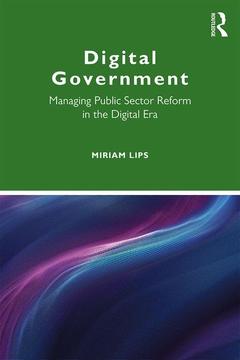Digital Government Managing Public Sector Reform in the Digital Era Routledge Masters in Public Management Series
Auteur : Lips Miriam

Digital Government: Managing Public Sector Reform in the Digital Era presents a public management perspective on digital government and technology-enabled change in the public sector. It incorporates theoretical and empirical insights to provide students with a broader and deeper understanding of the complex and multidisciplinary nature of digital government initiatives, impacts and implications.
The rise of digital government and its increasingly integral role in many government processes and activities, including overseeing fundamental changes at various levels across government, means that it is no longer perceived as just a technology issue. In this book Miriam Lips provides students with practical approaches and perspectives to better understand digital government. The text also explores emerging issues and barriers as well as strategies to more effectively manage digital government and technology-enabled change in the public sector.
Digital Government is the ideal book for postgraduate students on courses in public administration, public management, public policy, political science and international relations, and e-government. It is also suitable for public service managers who are experiencing the impact of digital technology and data in the public sector.
Part I INTRODUCTION
- Introducing and positioning digital government
- The contribution of digital technologies and data to societal change
- Different theories and perspectives on digital government
- The service state
- Open and transparent government
- Smart government
- Participatory democracy and public engagement
- Citizen identity, privacy, ethics and security
- Digital citizenship
- Digital government strategy, leadership and governance
- Conclusions: managing institutional innovation and digital governance
Part II THEORY
Part III AREAS OF PUBLIC SECTOR REFORM
Part IV EMERGING ISSUES
Part V CONCLUSIONS
Miriam Lips is Professor of Digital Government and Programme Director of the new e-Government Master’s programme at Victoria University of Wellington’s School of Government, New Zealand.
Date de parution : 07-2019
15.6x23.4 cm
Disponible chez l'éditeur (délai d'approvisionnement : 14 jours).
Prix indicatif 50,12 €
Ajouter au panierDate de parution : 07-2019
15.6x23.4 cm
Thèmes de Digital Government :
Mots-clés :
Digital Government; UK Portal; UK Central Government; e-government; Digital Government Initiatives; e-engagement; Digital Government Service; e-democracy; Public Engagement; ICT in the public sector; Open Government Data; e-government reform; Direct Democracy; public policy; Socio-technical Assemblages; public sector reform; Van De Donk; digital technologies; UK House; Citizen Government Relationships; Digital Government Strategies; Digital Governance; Public Sector Reform Efforts; Contextual Integrity; Citizen-centric Government; Socio-technical Phenomenon; Digital Inclusion; Open Government Data Initiatives; Smart Government; Digital Divide Issue; Digital Inequalities Research; Digital Exclusion; Government Service Provision
